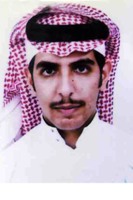|
|
|
Majid bin Muhammad al Majid, from the Saudi Interior Ministry’s list of 85 most-wanted terrorists. |
The Abdullah Azzam Brigades, an al Qaeda-linked terror group that operates throughout the Middle East, has named its leader for the first time and said it supports the Syrian revolution.
The Abdullah Azzam Brigades released a video on June 19 of its “emir,” Majid bin Muhammad al Majid. The statement was published on jihadist forums and has been translated by the SITE Intelligence Group.
Majid, a Saudi citizen, is on Saudi Arabia’s list of 85 most-wanted individuals for links to al Qaeda, which was released in 2009.
“This is the first release to identify the Brigades’ leader,” the SITE Intelligence Group said. The Al-Fajr Media Center, which distributes al Qaeda’s propaganda, previously “had released two audio speeches from Majid about Saudi Arabia, but did not identify his role in any jihadi group.”
Majid is the third Saudi known to serve in the top echelon of the Abdullah Azzam Brigades’ leadership cadre. Saleh al Qarawi, who is also on the Saudi list from 2009, serves as a top military commander in the Abdullah Azzam Brigades. Qarawi was added to the US’s list of Specially Designated Global Terrorists in December 2011. Suleiman Hamad Al Hablain, a Saudi who serves as an explosives expert for the group, was designated by the US as a global terrorist in November 2011. Majid has not been named by the US as a Specially Designated Global Terrorist.
In Majid’s statement on the Syrian revolution, he said that Syrians should support the uprising against President Bashir al Assad’s regime, and that further rebellions against Muslim governments would follow.
Majid offered advice to his “brothers from amongst the soldiers of the revolution and those who carried weapons for jihad against the enemies of Allah.” He cautioned fighters against conducting any attack that “repulses people,” and said attacks inside Syria’s cities should be avoided.
“Stay away from that which repulses people and makes them stop demonstrating and stop supporting the peaceful and the armed revolution,” Majid said.
“Avoid detonating booby-trapped vehicles, explosive belts and so forth inside the cities, even if the targets are important, because preserving the popularity of the revolution is more important and constant for the work,” he continued. He appears to be referring to suicide and IED attacks that have been carried out by the Al Nusrah Front, another al Qaeda-linked group that operates in Syria.
The Abdullah Azzam Brigades released an official statement in late December 2011 denying responsibility for a suicide attack in Damascus. Instead the group blamed the attacks on President Assad’s regime.
“The mujahideen, in all their groups, have no connection to these vicious bombings, and accusing them of it is falsehood and lies. The one truly responsible for them is he who is benefiting from them, and it is the regime of al Assad and his intelligence agencies,” the statement said, according to the SITE Intelligence Group.
Background on the Abdullah Azzam Brigades
|
|
|
Saleh al Qarawi, from the Saudi Interior Ministry’s list of 85 most-wanted terrorists. |
The Abdullah Azzam Brigades was formed by Saleh al Qarawi sometime after 2004 as an offshoot of al Qaeda in Iraq, and was tasked with hitting targets in the Levant and throughout the Middle East. The Abdullah Azzam Brigades is named after al Qaeda’s co-founder and Osama bin Laden’s mentor. The group was added to the US’s list of Specially Designated Global Terrorists in May.
Qarawi has been described as a “field commander” by Flashpoint Intel, which published a translation of an interview that was released in April 2010. According to Qarawi, he fought with former al Qaeda in Iraq leader Abu Musab al Zarqawi in Fallujah (presumably in the two battles in 2004), and was ordered by Zarqawi to form the Abdullah Azzam Brigades.
“Allah rewarded me to participate with my brothers in Fallujah, and I came to know the Sheikh Abu Musab al Zarqawi–may Allah have mercy on him–closely, and he assigned me to a job outside of Iraq,” he said.
In the same interview, Qarawi said that the Abdullah Azzam Brigades are tasked not only with striking in Lebanon, but elsewhere.
“[The Abdullah Azzam Brigades] are not confined to Lebanon but there are targets that our fires will reach Allah‐willing in the near future…the Brigades are formed of a number of groups that are spread in numerous places…and the groups of ‘Ziad al‐Jarrah’ in Lebanon are only some of our groups, and we rushed to create these groups and announced them because of the urgency of the battle with the Jews and the priority of the initiative at the time and the place, but the rest of the groups are outside Lebanon.”
The “Ziad al Jarrah” is one of several battalions in the Abdullah Azzam Brigades. It operates primarily in Lebanon, and is named after Ziad al Jarrah, a Lebanese citizen who was one of the masterminds of the Sept. 11 attacks on the US. He was the pilot of United Airlines Flight 93, which crashed into a field in Shanksville, Penn. after passengers attempted to retake the plane from the terrorist hijackers.
Yusuf al ‘Uyayri Battalion, another unit in the Abdullah Azzam Brigades, operates on the Arabian Peninsula and has claimed it executed the attack on the M Star, a Japanese oil tanker traveling off the coast of Oman from Qatar to Japan.
The US State Department has said the Abdullah Azzam Brigades conducted rocket attacks against Israel. In April 2011, the group said it launched Grad rockets against the southern Israeli city of Askelon as well as homemade rockets against the Zekim military base.
The Abdullah Azzam Brigades releases propaganda on a routine basis. Over the past three years, the group has advocated for the overthrow of the Saudi government and called for an uprising in Lebanon, as well as voiced support for Syrian protesters. The terror group also released a statement immediately after the death of al Qaeda emir Osama bin Laden in May 2011.
“May Allah have mercy on Osama, the Sheikh of Jihad, the Imam of Piety, the example of asceticism and the model of patience, the pioneer of glory in this age, and the awakener of the Ummah from its slumber,” the terror group said, in a statement translated by the SITE Intelligence Group. The group also said it had been formed “after incitation” by bin Laden.
“We in the Brigades of Abdullah Azzam bear witness that we only went out for jihad after incitation from Sheikh Osama bin Laden, by his words and his actions. He is the one enacted among the people of the time, the tradition to invade infidels in their homes, and created a front to fight the Jews and the Crusaders,” the statement said.
Groups calling themselves the Abdullah Azzam Brigade have also claimed attacks in Egypt and Pakistan. It is unclear if the groups are linked.
Both the Abdullah Azzam Brigades and Tawhid and Jihad claimed they had carried out the July 2005 bombings in Sharm al Sheikh, Egypt that killed 88 people and wounded 150 more. The bombings occurred at cafes and markets frequented by foreigners in the Red Sea resort town.
And a group calling itself the Abdullah Azzam Brigade claimed credit for the June 2009 suicide assault on the Pearl Continental Hotel in a high-security zone in Peshawar, Pakistan. A spokesman named Amir Muawiya claimed the attack and said the Taliban and al Qaeda shura directed that all future strikes would be claimed by this group. Amir Muawiya is a leader in the Commander Tariq Group, a Taliban faction based out of Darra Adam Khel in northwestern Pakistan.










6 Comments
Not unsual to see a Saudi in charge of a salafi jihadi group.When will we learn not to trust the Saudis?
This effort at seeking to drag Lebanon into the Syrian debacle should make for some interesting developments. I wonder how Iran’s proxy Hezbollah will react/respond to an AQ Muslim Brotherhood mix on their home turf. Not to mention those elements of the Palestinians who’ve appeared at one time or another in league with just about anybody.
Hillary Clinton and John McCain are throwing SO MUCH money at this Syrian problem and throwing SO MANY weapons, high tech ones through their French kissing arrangements with their Saudi masters.
I remember well the Saudis promised the Americans not to worry about Stingers and heavy weapons going to radical Islamists in Afghanistan, while bin Laden was getting HUNDREDS of millions from those same Saudis.
I have not forgotten that and we should not repeat the same mistake.
I don’t want Zawahiri getting 45 pairs of night vision goggles through Saudi “partners” for him to use in Mali and Nigeria as well.
We need to pay attention.
Interesting. And anti-Saudi militant in Syria where the Saudis are working behind-the-scenes to arm the rebel groups. Their various connection with other groups or their operations in Hezbollah territory don’t surprise me. Jihadists have established a complex web throughout the greater Middle East and Asia that has made for some strange bedfellows. One irony I note is that this chap seems to be applying some of the lessons learned from his predecessor, al Zarqawi: recklessly targeting civilians will turn the local populace against you. This was something that hastened the death of AQI in Iraq. Even if it’s just lip service, it shows that message discipline is something this group is concerned with.
Wallbanger re your quote below:
“Their various connection with other groups or their operations in Hezbollah territory don’t surprise me. Jihadists have established a complex web throughout the greater Middle East and Asia that has made for some strange bedfellows.”
I hope you are not describing the Shia of Iran and Hezbollah and al Qaeda as “Bedfellows” here.
What we are actually smack in the middle of is a global war between Sunnis and Shia and in a Civil War outside parties need to make their decisions accordingly.
Each is BUTCHERING the other. Zarqawi. Al-Sadr.
That ain’t bedfellows. That’s a blood feud make Hatfield and McCoy look trivial.
@Tony Buzan: Stranger things have happened. See here: https://www.longwarjournal.org/threat-matrix/archives/2010/06/hezbollah_fighter_killed_in_no.php
And here: http://www.nowlebanon.com/NewsArchiveDetails.aspx?ID=183837
Your point is well taken. However, throughout the Middle East and Asia, various jihadist groups exist and coexist, though not always peacefully, with other extremist groups/factions. In the face of a common enemy, they will and have cooperated. The connections they have can be baffling, especially when every one “knows” that AQ and Hezbollah don’t mix. But there are examples that prove this wrong. AQ itself was given training by “Iranian operatives” (read: Hezbollah) in the Bekka Valley in 1993. The Bekka Valley. That’s Hezbolla turf. Consider also the Naamen Meziche case from last week. See here: https://www.longwarjournal.org/archives/2012/06/pakistan_detains_al.php. Meziche had ties to the 9/11 plot (AQ job) and yet was also known to have traveled to Iran (Hezbollah territory). In fact, he was sheltered by the Iranian government, Hezbollah’s putative puppet-master (and yes, I am aware that some, especially the leadership of Hezbollah, would dispute that characterization). Many examples of AQs reach into Iran have been documented (e.g., see here: http://www.weeklystandard.com/Content/Public/Articles/000/000/006/782ppuml.asp?page=1), proving that there is something to the old adage that, “the enemy of my enemy is my friend.”